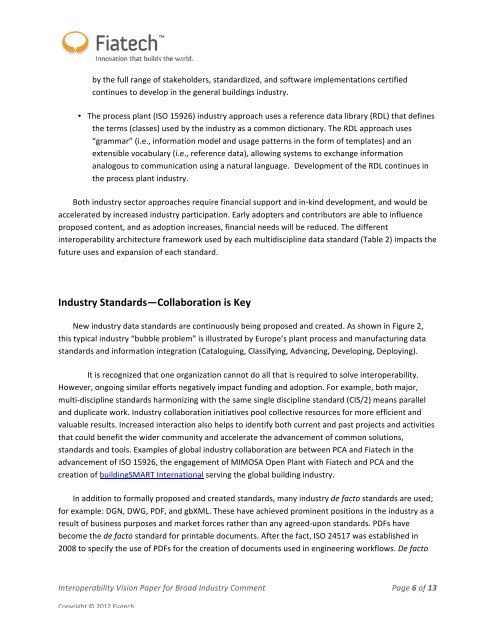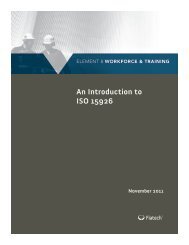Advancing Interoperability for the Capital Projects ... - iRINGToday
Advancing Interoperability for the Capital Projects ... - iRINGToday
Advancing Interoperability for the Capital Projects ... - iRINGToday
Create successful ePaper yourself
Turn your PDF publications into a flip-book with our unique Google optimized e-Paper software.
y <strong>the</strong> full range of stakeholders, standardized, and software implementations certified <br />
continues to develop in <strong>the</strong> general buildings industry.<br />
• The process plant (ISO 15926) industry approach uses a reference data library (RDL) that defines <br />
<strong>the</strong> terms (classes) used by <strong>the</strong> industry as a common dictionary. The RDL approach uses <br />
“grammar” (i.e., in<strong>for</strong>mation model and usage patterns in <strong>the</strong> <strong>for</strong>m of templates) and an <br />
extensible vocabulary (i.e., reference data), allowing systems to exchange in<strong>for</strong>mation <br />
analogous to communication using a natural language. Development of <strong>the</strong> RDL continues in <br />
<strong>the</strong> process plant industry. <br />
Both industry sector approaches require financial support and in-‐kind development, and would be <br />
accelerated by increased industry participation. Early adopters and contributors are able to influence <br />
proposed content, and as adoption increases, financial needs will be reduced. The different <br />
interoperability architecture framework used by each multidiscipline data standard (Table 2) impacts <strong>the</strong> <br />
future uses and expansion of each standard. <br />
Industry Standards—Collaboration is Key <br />
New industry data standards are continuously being proposed and created. As shown in Figure 2, <br />
this typical industry “bubble problem” is illustrated by Europe’s plant process and manufacturing data <br />
standards and in<strong>for</strong>mation integration (Cataloguing, Classifying, <strong>Advancing</strong>, Developing, Deploying). <br />
It is recognized that one organization cannot do all that is required to solve interoperability. <br />
However, ongoing similar ef<strong>for</strong>ts negatively impact funding and adoption. For example, both major, <br />
multi-‐discipline standards harmonizing with <strong>the</strong> same single discipline standard (CIS/2) means parallel <br />
and duplicate work. Industry collaboration initiatives pool collective resources <strong>for</strong> more efficient and <br />
valuable results. Increased interaction also helps to identify both current and past projects and activities <br />
that could benefit <strong>the</strong> wider community and accelerate <strong>the</strong> advancement of common solutions, <br />
standards and tools. Examples of global industry collaboration are between PCA and Fiatech in <strong>the</strong> <br />
advancement of ISO 15926, <strong>the</strong> engagement of MIMOSA Open Plant with Fiatech and PCA and <strong>the</strong> <br />
creation of buildingSMART International serving <strong>the</strong> global building industry.<br />
In addition to <strong>for</strong>mally proposed and created standards, many industry de facto standards are used; <br />
<strong>for</strong> example: DGN, DWG, PDF, and gbXML. These have achieved prominent positions in <strong>the</strong> industry as a <br />
result of business purposes and market <strong>for</strong>ces ra<strong>the</strong>r than any agreed-‐upon standards. PDFs have <br />
become <strong>the</strong> de facto standard <strong>for</strong> printable documents. After <strong>the</strong> fact, ISO 24517 was established in <br />
2008 to specify <strong>the</strong> use of PDFs <strong>for</strong> <strong>the</strong> creation of documents used in engineering workflows. De facto <br />
<strong>Interoperability</strong> Vision Paper <strong>for</strong> Broad Industry Comment <br />
Page 6 of 13 <br />
Copyright © 2012 Fiatech.



